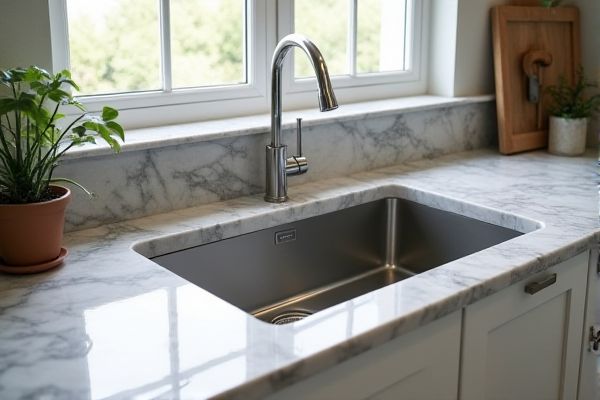
Granite composite sinks offer exceptional durability, resistance to scratches, and a natural stone appearance, while stainless steel sinks provide a sleek, modern look with excellent heat and stain resistance. Explore the rest of the article to discover which sink best suits your kitchen needs and lifestyle.
Table of Comparison
| Feature | Granite Composite Sink | Stainless Steel Sink |
|---|---|---|
| Material Composition | Blend of crushed granite and resin | High-grade stainless steel (304 or 316) |
| Durability | Scratch-resistant and impact-resistant | Highly durable but prone to scratches |
| Heat Resistance | Heat resistant up to 536degF (280degC) | Heat resistant above 600degF (315degC) |
| Noise Levels | Low noise due to dense material | Can be noisy without soundproofing |
| Maintenance | Easy to clean, stain resistant | Requires regular polishing to prevent water spots |
| Appearance | Matte finish with various color options | Shiny metallic finish, modern look |
| Cost | Moderate to high price range | Typically more affordable |
| Lifespan | 10-15 years with proper care | 15-30 years, highly resilient |
Introduction: Granite Composite vs Stainless Steel Sinks
Granite composite sinks offer superior durability, scratch resistance, and heat tolerance compared to stainless steel sinks, making them ideal for heavy kitchen use. Stainless steel sinks provide a sleek, modern look with excellent corrosion resistance and ease of maintenance, favored in professional and contemporary kitchens. Both materials vary in weight, cost, and noise levels, influencing homeowner preferences based on kitchen design and functionality requirements.
Material Composition and Manufacturing
Granite composite sinks combine crushed granite stone sand with acrylic resins, resulting in a durable, non-porous surface resistant to scratches, stains, and heat. Stainless steel sinks are manufactured from high-grade corrosion-resistant steel alloys, typically 304 or 316 stainless steel, offering excellent durability and resistance to rust and dents. The manufacturing process for granite composite involves molding and curing under high pressure and temperature, while stainless steel sinks are formed through sheet metal stamping and welding, which influences their respective strength and aesthetic qualities.
Appearance and Design Options
Granite composite sinks offer a rich, matte finish with a variety of colors like black, white, and gray, providing a natural stone look that complements modern and rustic kitchens. Stainless steel sinks feature a sleek, shiny surface with brushed or polished textures, available in multiple gauge thicknesses and basin configurations, ideal for contemporary and industrial designs. Both options provide versatile shapes and sizes, but granite composite often stands out for its bold, seamless integration with countertop materials.
Durability and Resistance to Damage
Granite composite sinks offer exceptional durability, resisting scratches, chips, and heat due to their dense, non-porous material composed of natural granite and resin. Stainless steel sinks provide strong resistance to impact and corrosion; however, they can be prone to denting and surface scratches over time. Both materials maintain structural integrity, but granite composite excels in maintaining aesthetic appeal under heavy use.
Maintenance and Cleaning Requirements
Granite composite sinks require regular gentle cleaning with non-abrasive sponges and mild detergents to prevent surface scratches and maintain their matte finish. Stainless steel sinks are highly resistant to stains and can be cleaned effectively with household cleaners and occasional polishing to preserve their shine. Both materials benefit from prompt removal of food particles and standing water to prevent damage and extend their lifespan.
Cost Comparison and Value
Granite composite sinks typically cost less than stainless steel sinks while offering high durability and resistance to scratches and stains, providing excellent value for budget-conscious homeowners. Stainless steel sinks tend to have a higher upfront cost but offer superior heat resistance and a timeless look, which can increase your home's resale value. Choosing between the two depends on your priorities for long-term investment and style preferences within your kitchen design.
Installation Considerations
Granite composite sinks require precise mounting due to their weight and material rigidity, typically favoring undermount or top-mount installation with strong adhesive and silicone sealant to prevent leaks. Stainless steel sinks offer more flexibility with installation, accommodating undermount, drop-in, or farmhouse styles, and are generally easier to handle due to their lighter weight. Choose the sink that best aligns with your countertop type and installation expertise to ensure durability and a secure fit in Your kitchen.
Noise and Sound Dampening
Granite composite sinks excel in noise reduction due to their dense material composition, effectively minimizing water splashes and dishwashing sounds. Stainless steel sinks tend to be noisier but can improve sound dampening when paired with undercoating or sound-absorbing pads. You can enjoy a quieter kitchen environment with a granite composite sink compared to the typical noise level of stainless steel models.
Environmental Impact and Sustainability
Granite composite sinks are often made from a blend of natural stone and resin, offering durability with less environmental impact due to the use of recycled materials and lower energy consumption during manufacturing. Stainless steel sinks, while highly recyclable and longer-lasting, require significant mining and energy-intensive processing that can contribute to environmental degradation. Choosing granite composite sinks supports reduced carbon footprints and waste, whereas stainless steel sinks emphasize recyclability and longevity in sustainable kitchen design.
Which Sink is Right for Your Kitchen?
Granite composite sinks offer superior scratch resistance and a natural stone appearance, making them ideal for heavy-duty use and aesthetic appeal in modern kitchens. Stainless steel sinks provide excellent durability, heat resistance, and a sleek, timeless look, fitting well in both contemporary and traditional spaces. Choosing the right sink depends on lifestyle needs, with granite composite excelling in durability and style, while stainless steel offers versatility and ease of maintenance.
 homyna.com
homyna.com